
 Flash News
Flash News
The body of a 29-year-old man in Klos is found after 6 days
Arrested a few meters from SPAK, the Special Prosecution seeks 17 years in prison for the drug 'boss'
Giro D'Italia starts today, here are the road axes that will be blocked in Tirana from 13:00-18:00
Who is the new Pope?
Pope Leo XIV greets the faithful for the first time in St. Peter's Square

Alfred Lela
The abstention of three SP MPs a few days ago, when the socialist leadership approved the law for the legalization of cannabis, passed as summer events pass in Albania. The political programs of the evening did not treat it as a topic, even though there was more politics in that attitude than in the rigid unanimity of the ruling party with the Prime Minister's decisions.
In short, the symbolic silence of Pandeli Majko, Fatmir Xhafaj, and Erion Brace was not qualified for political debate. There is no question of being able to go further and turn this position into a public discussion, i.e., beyond political engagement on a political issue.
Albania no longer thinks, which can be seen in the fact that it has become a national issue, for example, Luizi of Big Brother, and national issues are overlooked.
Since this editorial is not intended to circumcise the national head that does not think, it will stop at the profile of the three socialists of the Assembly. What distinguishes Majko, Braçe, and Xhafajn from the broad chorus of Renaissance is that they are the last three socialists in the Socialist Party. Of course, everyone in the SP says they are socialists, from Edi Rama to Bora Muzhaqi, but there is a qualitative difference between the trio and them. They can easily be identified as conservative socialists, politicians who believe in a traditionalist way of looking at issues, a belief that the public is communal, not partisan. Someone, probably, can insert into the thread of the debate the shadow of a doubt that their attitude has nothing to do with the issue, what with their grudge against Prime Minister Rama. Anyone can be considered 'out of favor' with the head of the government and the party. The next question worth asking is: would they abstain if their votes were crucial to the law's passage?
Both the doubt and the question are hypothetical, but the fact remains. Majko-Xhafaj-Braçe symbolically resisted the progressive agenda of Edi Rama, who by following the "Third Way" beyond the left and the right, has produced, both for the majority that presides and for the country, a Republic that follows fashion but remains a cradle in the fabulous catwalk of things, goals, and futures.
Rama's haste to import the world's radical tendencies into Albania, mainly of the leftist-progressive spectrum, proved the country's lack of a straightforward program.
Just remember the history of cannabis, which this law liberalizes. At first, he declared war on his disappearance and entered Lazarat with special forces, an attempt in which a police officer was killed. The policy followed later was the illegal liberalization of the narcotic, exporting thousands of tons across Europe, fueling gang clashes and dozens of deaths. What was more serious was the creation of a national laissez-faire in which industry was involved, from students to teachers. When it appeared that the pressure of European policing increased and with it the political costs, Rama undertook the third step, the legalization of cannabis under the 'medical' diminutive.
Majko-Braçe-Xhafaj is in the SP before Rama's "Third Way" and carries the consciousness of a more earthy, traditional socialism, which is reluctant to extreme liberalism. Perhaps the question they grapple with, as old politicians, relates precisely to liberalism. If Nano's liberalism produced corruption that returned the right to power, what can Rama's hyper-liberalism produce?!
This is a question that Bora Muzhaqi cannot ask.
Latest news


Is Rama ready to become the next Hoxha?
2025-05-09 13:50:12
Election materials arrive in Kukës, Has and Tropoja
2025-05-09 13:30:20
Electoral flight to Vlora
2025-05-09 13:18:04

IdentiTek offices open on Saturdays
2025-05-09 13:03:13
Will artificial intelligence help us talk to animals?
2025-05-09 12:55:58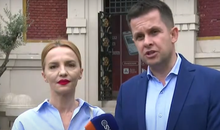

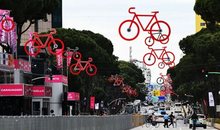

Rama's fourth act: between Brussels and the Mafia
2025-05-09 12:12:47
The body of a 29-year-old man in Klos is found after 6 days
2025-05-09 12:01:27
Berisha: After May 12, this opposition will become the majority in Albania
2025-05-09 11:52:37
Leo XIV celebrates his first Mass as Pope
2025-05-09 11:42:34

Spaho denounces: SP candidate in Pogradec gives 100 thousand lek for the vote
2025-05-09 11:27:26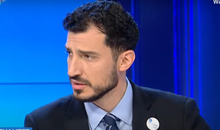
Mustafaj: Proud of the worthy campaign of the DP
2025-05-09 11:22:20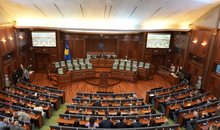
Constitution fails again, Kosovo still without a new Assembly
2025-05-09 11:06:55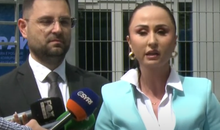





"Votes have no price", the US embassy in Tirana 'slaps' Rama
2025-05-09 10:06:49

Two young men arrested for supplying criminal groups with firearms
2025-05-09 09:45:19
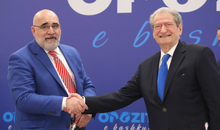






Foreign exchange/ How much foreign currencies are bought and sold today
2025-05-09 08:19:18
The gift that Berisha gave to Rama 'live'
2025-05-09 08:13:51
3 signs that show you are spiritually protected
2025-05-09 08:05:39

Bars can't hold back anymore, start increasing coffee prices, 4.7% more in April
2025-05-09 07:46:49

Horoscope, what do the stars have in store for you today?
2025-05-09 07:22:06
Unstable weather, afternoon brings rain
2025-05-09 07:01:29
Morning Post/ In 2 lines: What mattered yesterday in Albania
2025-05-09 06:45:46

How did LaCivita change the DP campaign? Berisha: He studied the opponent
2025-05-08 22:49:51

David defeats Goliath
2025-05-08 22:15:50

Journalist: There are SPAK infiltrators in party headquarters
2025-05-08 21:55:15
Who is the new Pope?
2025-05-08 21:48:13
Berisha finally reveals when he will retire from politics
2025-05-08 21:33:46


LaCivita in Lezha: Albanians will fire Edi Rama from his job
2025-05-08 21:11:20


Berisha: LaCivita chose us because he believes in Reagan's program
2025-05-08 20:48:40
He rejected America to serve Pogradec, Genti Çela tells about life in "Elevate"
2025-05-08 20:26:28



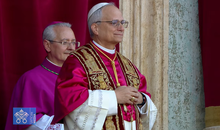
Pope Leo XIV greets the faithful for the first time in St. Peter's Square
2025-05-08 19:29:33




Photo session with LaCivitta in Tirana: For Great Albania
2025-05-08 18:40:18
Source: DASH decision a personal victory for Berisha
2025-05-08 18:30:10
Take off those crazy glasses and see where you've taken him?
2025-05-08 18:02:47
LDK files criminal charges against members of the incumbent Government
2025-05-08 18:02:00







BIRN analysis: Tirana, the determining district for the future majority
2025-05-08 16:04:03




Chris LaCivita's contract with the DP, Berisha: 100% correct and clean
2025-05-08 15:11:11

"These are the peak days", Berisha reveals when he will travel to the USA
2025-05-08 14:45:25


Endless boxes with filled-in ballots, DP demands separation of votes from Greece
2025-05-08 14:11:12


Photo/ Who are the 3 associates of Talo Çela arrested in Dubai?
2025-05-08 13:37:09

Hetimi për krimet zgjedhore, Altin Dumani zbarkon në Prokurorinë e Shkodrës
2025-05-08 13:06:21
DASH paves the way for Berisha, Alizoti: Great news on the eve of Great Albania!
2025-05-08 13:03:48

"Freedom works", DP welcomes the US position
2025-05-08 12:48:07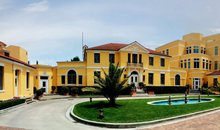
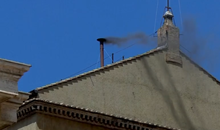
Black smoke rises from the Sistine Chapel, the Vatican still without a Pope
2025-05-08 12:26:18

